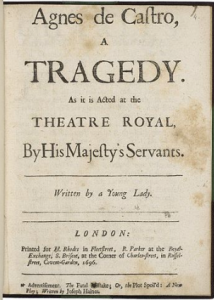CONTENTS

Wikimedia Commons. Catharine Trotter. Accessed 16/04/18.
Catherine Trotter: a brief summary of her life, work, and legacy
A summary of the play, and a map of the characters showing how they are connected.
Colley Cibber (who played Lorenzo): a short biography of his life.
‘Ex-Boyfriends are just off limits to friends!’
What Agnes de Castro and Mean Girls have in common, and why Constantia is a misfit in the world of tragedy.

Wikimedia Commons. Agnes De Castro. Accessed on 16/04/18.
A closer look at the tragic genre and its use of metaphor, and a summary of and response to Isabel Pinto’s analysis of Agnes De Castro.
Trust Vs. Tragedy: #Girls Rule
An analysis of the two central female relationships, showing how Trotter transforms Aphra Behn’s novella into a feminist play.
Girl Power – The Women of Agnes de Castro
The power imbalance and stereotypes in the play.
Taking Agnes de Castro into the 21st century: how feminism was totally around in Catherine Trotter’s time.
NOTE: This blog has been lightly copy-edited by James Harriman-Smith. Please contact him with any queries.
